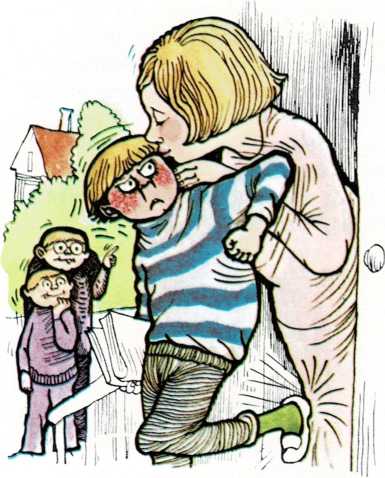Portrait of the preteen

Preteens are not quite the children they were. And yet, they are not
quite the teenagers they will become. They are in a transitional
period—a period of preparation.
Something new is going to be added, and for this reason they are
changing. They are something like a department store that is undergoing
renovation while still conducting business.
Preteen changes and preparations may shake children’s personalities.
These children

Preteens often avoid shows of affection.
used to be fairly easy to get along with and eager to please. Suddenly
they become reluctant and defiant. Boys who used to pride themselves on
keeping a neat room drop their clothes on the floor as they make their
way to the bathroom for the nightly shower. Girls who depend on parents
for the choice of their clothes suddenly break down in tears when an
adult makes the slightest comment on their appearance. Reluctance,
defiance, and tears—all are characteristics of preteens.
When children were younger, they usually relied on their parents’
judgment. They felt safe and secure and had pleasant personalities. But
during the preteen years, they pick up new ideas. They make more of
their own judgments, and they are not always confident that their
judgments are correct. They become less secure, and as a result their
personalities may become a little less likable. Every preteen goes
through this to a certain extent. It is part of loosening up the
childish personality to make room for the independent adolescent
personality. A child’s adolescence may, in fact, actually “begin” during
this preteen period.
The body itself—especially a girl’s—is preparing for the changes and
additions brought on by puberty. And, of course, the preteen is
preparing to move away from family ties—a move that will be the
child’s major task during the teen-age years.
This time of preparation and change begins around the end of the fifth
or sixth grade and usually lasts into the seventh or the beginning of
eighth grade. As in all de-
velopmental stages, exact ages cannot be- given. Individual differences
in physical, intellectual, and emotional growth are as varied as are the
circumstances under which youngsters go through such a phase. Also, not
every child gets hit by this change in the same way, nor in all areas of
life at the same time.
Restlessness
If your preteen reaches for gadgets on your desk while you are having a
serious talk, don’t think the child is being disrespectful. Fiddling
with everything in sight while supposedly doing homework does not mean
the child wants to play instead of work. The preteen literally cannot
help it. Any gadget in sight must be handled. This “manipulative
restlessness” is enormous. Workbooks look as though they had been fished
from last year’s trash can. Pencil tops are chewed up long before the
writing parts are even slightly used. And if no gadgets are around, then
body parts are acceptable substitutes. The child may pull at one earlobe
or the other, drum fingers on the desk or table, scratch at elbows, or
twist locks of hair.
The preteen’s restlessness also shows up in a short activity span. Most
preteens cannot stick to anything for long, even if it is something they
enjoy—an experience for which they have been longing.
Parents should try to allow for their pre- teens’ restlessness, and when
they have to interfere, they should do so in a reasonable and friendly
way, without showing indignation or excitement. They should try to
provide opportunities for children to rid themselves of restlessness
with as little disturbance to others as possible. For instance, periods
of quiet work can be broken up with some activity—giving preteens a
chance to move around, stretch, sing, talk, and yell. Preteens just
cannot be forced to spend most of the day sitting and writing, reading,
or listening. If parents or teachers can suggest ways for preteens to
satisfy the need for activity and manipulation, the children will
probably find it easier to remain quiet when they must study or do other
things that require sitting still.

The restless preteen is almost always in motion.

Even when seriously at work, a preteen may be biting a lip or
chewing a pencil end.

Talking, laughing, shifting in a chair—the preteen finds it hard
to do “nothing.”

Almost every preteen indulges in daydreams—fantasies that help the
child deal with new feelings or feelings that are not easily
expressed.
Also, remember that children cannot easily change preteen habits and
behavior patterns. They have to go through this stage. They do not
purposely do these things to annoy adults. Parents should avoid constant
nagging and reminders that make preteens embarrassed and self-conscious.
Forgetfulness
Preteens forget. And, there seems to be no excuse—especially since
they can remember things their parents wish they would forget. For
example, a teacher assigns homework on Friday to be turned in Monday.
The teacher writes the assignment on the board and makes half the class
repeat it. Yet on Monday, when the assignment is due, a third of the
class has forgotten all about it.
Obviously, children sometimes use forgetting as an alibi. The amazing
thing is that half of those who said they forgot were tell
ing the truth. They really forgot. Preteens block out things that
interfere with their pursuit of happiness. These memory blocks save them
from unpleasant guilt feelings. A person who really forgets obviously
cannot help it. Remind your preteen of obligations, but try to do so
without nagging.
Daydreaming
Otherwise alert preteens may stare into space in the middle of a class,
even when the subject is one they are good at and interested in.
Youngsters of other ages can tell you what they daydream about. However,
if you ask preteens what they were thinking about they usually answer,
“Nothing.” This may not be an evasion. Preteens have an extraordinary
ability to think of nothing—or at least nothing that they can describe
or name. Frequently, their daydreams are not organized at all. One
picture after another flits through their
minds. You might compare this to your own thoughts just before falling
asleep.
When there is content in the daydreams, this varies as widely as do
preteens themselves. However, two basic kinds of daydreams dominate
preteen fantasies.
One is a “technological” daydream. Many technically inventive and gifted
children spend a lot of time looking at such things as a speck on the
wall or a piece of string or wire. In their minds, such spots of color
or pieces of metal or wood combine in the widest range of possibilities;
they see “gadgets.” Children may come out of such technical daydreams
with imaginative, demonstrable products.
The other trend in daydreams concerns extreme power, cruel victory,
destruction, fear of destruction, rebellion, mourning, and so on. They
include the whole range of emotional relationships the preteen lives
through, moves away from, or contemplates moving into. Many people worry
that comic books and television create these daydreams. Indeed, such
things may at one time or another be the cause. But if comic books and
television were not available, children would still daydream about
unpleasant things.
Daydreams fill a need of youngsters who are leaving one world
(childhood) and wondering about entering another (the teen-age years).
They must deal with puzzling and unpredictable themes, but cannot deal
with some of them directly because they would be punished by shame,
guilt, terror, panic, fury, or rage. So they daydream.
For example, if a boy dreams of cruelly killing a wild monster, it may
not mean that he has such wild needs troubling his soul. It may simply
mean that he was terribly embarrassed the day before when his father
scolded him in front of his buddies. The child cannot consciously direct
rage against his father, because he loves his father and knows his
father was right. However, the shame still burns. How can he deal with
it? He does so in the same way he deals with otherwise unmentionable
pain—he projects it into the future or the past. He makes familiar
people into strange ogres or powerful enemies. He destroys with
vehemence something that obviously cannot have anything to do with his
real life. Only then can
he let out the total force of his anger or panic or guilt or shame or
rage.
Success and praise
For young children, rewards that are “deserved” are especially
gratifying. Things received only by “chance,” while pleasant, are not a
source of pride. Not doing a job or assignment is shameful, while
“working hard at it” is something to be proud of.
During the preteens, this view of success and failure may suddenly
reverse, at least in part. Preteens are especially proud of what they
get away with. The fact that they worked hard on an assignment may be
embarrassing, and they may even try to hide what they did from their
group. To get something undeservedly (“This stupid teacher doesn’t even
know I haven’t done any work at all!”) seems to be the height of glory.
Argument against this attitude is not effective. Actually, many
youngsters pretend this attitude, though they do not mean it. But the
group code demands that preteens make light of their virtues, brag about
shrewd evasion of the consequences of their actions, and glory in the
luck or skill that brought them ill-gotten and undeserved gain.
It is easy to see, then, why youngsters of this age often react
irrationally when praised. For preteens, open praise makes them think
they are being treated like babies or teachers’ pets. Praise may be more
painful to them than the praising adult can imagine. If a preteen is
told that he has acted like a “little gentleman,” or that she has acted
like a “little lady,” chances are that the child will be insulted rather
than complimented.
Even the type of argument used with preteens needs examination. A boy
may well accept the fact that you want him to come to dinner with clean
fingernails. But arguing that a “nice little boy” would not want to
appear with dirty fingernails is like throwing gasoline on a burning
fire. Anything that makes preteens feel that you are treating them “like
little kids” hits the youngsters the wrong way. This does not mean that
parents should not interfere. But, they should try to treat their
children as the maturing young people they are.

